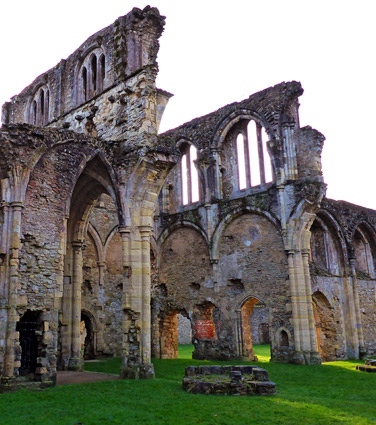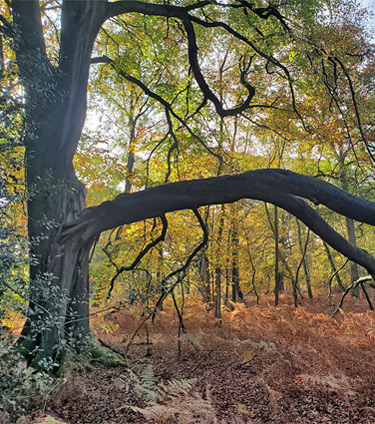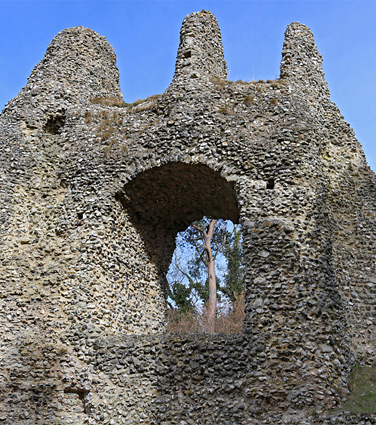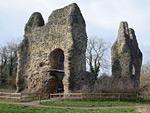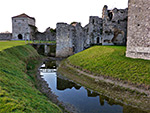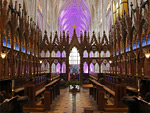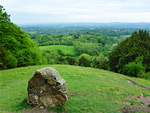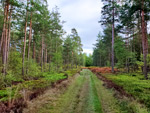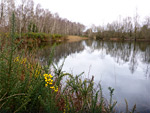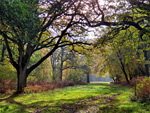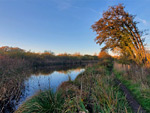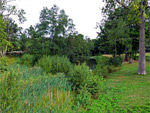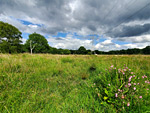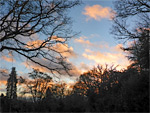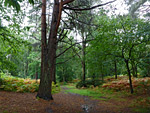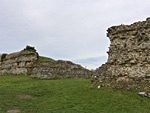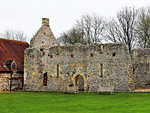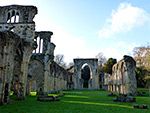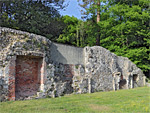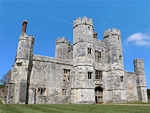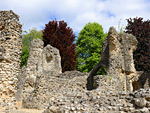The Channel coast of Hampshire includes some small scenic sections, such as around Barton-on-Sea in the west, though most is not so interesting, and/or developed, consisting largely of long beaches backed by dunes, fields or marshy areas. Inland, Hampshire contains nearly all of New Forest National Park, about a third of South Downs National Park, and a small part of the North Wessex Downs Area of Outstanding Natural Beauty, but, like most of the southern English counties, there are no especially wild or rugged areas. The southern half is low lying land, a mix of woods and grassland upon clayish soils, while the northern reaches are higher, underlain by chalk. There are many natures reserves; Ashford Hangers is one of the best.
The county town, Winchester, contains one of the finest, and largest cathedrals in Europe, next to the ruins of an ancient fortified palace (Wolvesey Castle), used by the bishops. The other most extensive religious ruined buildings are Bishop's Waltham Palace, Netley Abbey and Titchfield Abbey, while the best of around ten castles with at least some visible remains are Hurst, Odiham and Portchester. Hampshire has one renowned Roman site, the walled city of Silchester, but no major Prehistoric remnants.
The county town, Winchester, contains one of the finest, and largest cathedrals in Europe, next to the ruins of an ancient fortified palace (Wolvesey Castle), used by the bishops. The other most extensive religious ruined buildings are Bishop's Waltham Palace, Netley Abbey and Titchfield Abbey, while the best of around ten castles with at least some visible remains are Hurst, Odiham and Portchester. Hampshire has one renowned Roman site, the walled city of Silchester, but no major Prehistoric remnants.
CastlesCalshot Castle - small, circular coastal fort, built by Henry VIII; later damaged and restored |
| Hurst Castle - small fort in a remote location beside the coast, one of several constructed by Henry VIII |
| Odiham Castle Minor but photogenic castle ruins in a rural, riverside location; built by King John early in the 13th century Rating: ★★★★★ |
| Portchester Castle Historic castle right on the coast of Portsmouth Harbour, enclosed by the full-height walls of a 3rd century Roman fort Rating: ★★★★★ |
Southsea Castle - coastal fort on Portsea Island, built in 1544 by Henry VIII, and later modified several times |
| Winchester Castle - intact great hall and some minor ruins from one of the most prominent early Norman castles |
Cathedrals, and other major churchesRomsey Abbey - a former Benedictine monastery, now the largest parish church in the county; built in the 12th century |
| Winchester Cathedral Huge, Gothic-style building, amongst the largest cathedrals in Europe; some parts are from the 11th century Rating: ★★★★★ |
LandscapesAshford Hangers National Nature Reserve Large block of ancient beech woodland, and meadows, on steep, south-facing chalk slopes, with many wildflower species Rating: ★★★★★ |
| Beacon Hill National Nature Reserve Long-distance views and varied wildflowers, on a chalk hill towards the west edge of the South Downs Rating: ★★★★★ |
| Benyon's Inclosure Mature conifer plantation incorporating patches of ancient woodland, plus heath, acidic grassland, alder carr and a pond Rating: ★★★★★ |
| Bramshill Common Wood Large conifer plantation containing ponds, mires and patches of heath, with varied plant life Rating: ★★★★★ |
| Butter Wood Oak and beech woodland, formerly wood pasture plus some old coppices. Includes a section of abandoned canal Rating: ★★★★★ |
| Greywell Moors Nature Reserve Fen, wet meadows and other riparian habitats beside the Whitewater River, a chalk stream Rating: ★★★★★ |
| Highclere Park The grounds of Highclere Castle - woodland, pasture, grassland and two lakes, lined by marsh and fen Rating: ★★★★★ |
| Hook Common and Bartley Heath Woodland, heathland, wood pasture, marsh and a few ponds; two adjacent areas, around one mile across Rating: ★★★★★ |
| Odiham Common Ancient woodland pasture, one mile across, including several veteran oaks; good for fungi and lichens Rating: ★★★★★ |
| Pamber Forest Nature Reserve Ancient woodland of hazel and sessile oak, plus streams, wet meadows and patches of heath Rating: ★★★★★ |
Roman SitesSilchester Site of a Roman city, abandoned around the 6th century, still surrounded by walls up to 15 feet tall; also contains the remains of a large amphitheatre Rating: ★★★★★ |
Ruined Abbeys, and other old religious buildingsBeaulieu Abbey - relics from a major Cistercian monastery, parts of which were incorporated into a mansion, still inhabited |
| Bishop's Waltham Palace Atmospheric, quite substantial remains of a 13th century moated palace, destroyed after the Civil War Rating: ★★★★★ |
| Netley Abbey Large, well preserved, 13th century monastery near Southampton Water, later converted to a Tudor mansion Rating: ★★★★★ |
| Southwick Priory Foundations and one large wall fragment from an Augustinian priory established in 1133, subsequently transformed into a manor house Rating: ★★★★★ |
| Titchfield Abbey Premonstratensian monastery, converted to a mansion after the Reformation in the 16th century, then partially dismantled in the 1780s Rating: ★★★★★ |
| Wolvesey Castle Medieval ruins in the centre of Winchester, near the cathedral, mostly built in the 12th century; the main residence of the bishops Rating: ★★★★★ |
